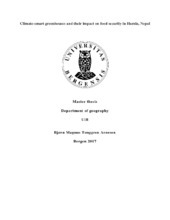Climate-smart greenhouses and their impact on food security in Humla, Nepal
Master thesis
Permanent lenke
https://hdl.handle.net/1956/16802Utgivelsesdato
2017-06-23Metadata
Vis full innførselSamlinger
- Department of Geography [634]
Sammendrag
With the basis in two villages in Humla, north-western Nepal, this thesis examined how greenhouses are affecting food security in a high mountainous area. The major focus was on the greenhouse project development in Humla and its impact on food security. Greenhouses, their implementation, possible challenges and how they affect gender relations were other focuses of interest. This was examined in the context of natural, social and economic factors in the area. The current study was based on food security theory and climate-smart agriculture theory, as well as innovation theory and climate change theory. This gave a broad basis for analysing and discussing the research questions. The areas of study were Chhipra village in Lower Humla and Yalbang village in Upper Humla. Both areas had their own set of natural conditions. This was especially evident in that Chhipra village was to a considerable higher degree than Yalbang village exposed to drought. Furthermore, Chhipra village was Hindu (mainly Chhetri caste), while the Yalbangs village was inhabited by the Buddhist Lama ethnic group. The villages therefore had their own social and economic predispositions as well, as Hindu and Lama societies are distinct in Humla. This became evident that socially Yalbang village was more homogenous than Chhipra village and that economically, Yalbang village was perceived as better-off. This gave a good basis for a comparative study between the villages, as well as interviews with NGOs and literature, allowed for exploring generalization possibilities from the village level to a regional level.
